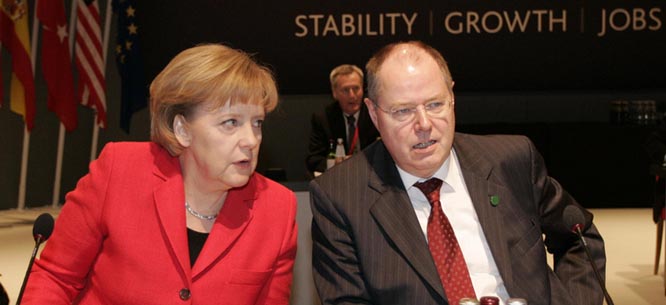Germany’s New Grand Coalition
Germany’s New Grand Coalition

In my essay on the German left in the fall issue of Dissent, I wrote that the likeliest outcome of the general election that was about to take place was a grand coalition of the Christian Democrats and the Social Democrats. That is exactly how it turned out on September 22. It was virtually a foregone conclusion that Angela Merkel would win a third term as chancellor. But the Christian Democrats did even better than expected and took a whopping 41.5 percent of the vote—which gives them almost half the seats in the Bundestag. However, their coalition partner, the Free Democrats, did even worse than expected—they did not even get the 5 percent needed to keep them in the Bundestag. The Social Democrats took 26 percent of the vote—not quite as bad as in 2009 but still pretty dismal.
After the election, there was much speculation about possible coalitions other than a grand coalition. A “black-green” coalition—that is, Christian Democrats and Greens—was possible, but negotiations quickly broke down. Some thought that the Social Democrats might refuse to enter a coalition with the Christian Democrats and instead attempt to form an “R2G,” or “red-red-green,” coalition with the Greens and Die Linke, the far-left party that grew out of the East German Communist Party. Some even speculated that Merkel might try to lead a minority government. But in the end the Social Democrats began extensive negotiations with the Christian Democrats and, exactly as most people expected all along, announced last week that they had reached agreement (though the Social Democrats still need to put it to a vote of their 400,000 members, who could conceivably reject it).
The agreement is a 185-page document covering minutiae of policy in all kinds of obscure areas—which is why it took so long to complete. But the overall message is more of the same. In particular, there is, as expected, no radical shift on policy toward Europe. The Social Democrats’ main priority was a national minimum wage—which my colleague Sebastian Dullien argues might reduce Germany’s current account surplus by 0.5 percent. But although the Social Democrats apparently raised the issue of a debt redemption fund, they quickly dropped it in the first round of negotiations. The agreement also explicitly rejects a European deposit insurance system—which some think is a necessary element of the banking union that aims to keep government debt in crisis-hit countries at manageable levels. In the terms I used in my Dissent essay, the Social Democrats chose Germany over Europe.
The speculation now is about who will get which jobs. They key questions are the finance ministry and the foreign ministry—the SPD will get one of the two but not both. The finance ministry is more powerful—and more relevant for policy toward Europe—but some Social Democrats saw it as a poisoned chalice because it would involve tough decisions. (Since the coalition agreement was signed, however, some Social Democrats, such as the candidate for chancellor Peer Steinbrück, have once again suggested that party leader Sigmar Gabriel should be finance minister). My hunch is that there will be no surprises, and the Social Democrats will get the foreign ministry, as the junior coalition partner traditionally does in Germany, after all—just as, despite all the speculation about various other possible coalitions, Germany ended up with a grand coalition.
Hans Kundnani is the research director at the European Council on Foreign Relations. He is the author of Utopia or Auschwitz: Germany’s 1968 Generation and the Holocaust (Hurst/Columbia University Press, 2009).






